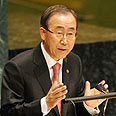

UN Secretary-General Ban Ki-moon hosted the dinner Tuesday night for leaders attending a two-day UN conference to promote a global dialogue about religions, cultures and common values that starts Wednesday.
"It's quite unique when you expect President Peres of Israel ... and many kings and leaders from the Arab world ... (sitting) down together and having dinner," Ban told reporters.
The secretary-general told reporters he was not going to organize any meeting between the Saudi king and the Israeli president.
An AP photographer allowed to take pictures at the start of the dinner, for about 40 VIPs, said there was no contact between Peres and Abdullah. The Saudi king walked by Peres towards his table, where he was seated next to Ban. The president was seated at a table some distance away.
"But sitting in the same room and engaging in (the) same functions – normally in the past they have not been sitting in the same place like this. That is again very important," Ban said before the event began. "I sincerely hope that through their participation in the meetings, and through this social-diplomatic gathering, they will be able to promote further understandings."
But Ban also criticized Israel for he humanitarian situation in Gaza, and Peres replied by saying that Hamas was responsible for the situation. Had the organization stopped the rocket fire, he said, Gaza would have been open and could have enjoyed peace and economic prosperity.
Peres also said he believed that the meeting had a potential to bring about change and create a coalition against the violence and terror of extremists in the Middle East.
Iran's attempt to control the region in the name of religion is dangerous not only to Israel, but to the world in general and the moderate Arab countries, he stated, adding that the Saudi king's initiative brings hope for change.
Before entering the reception dinner, Peres told Israeli reporters that the conference represented an attempt by a coalition of Arab Sunni states to curb the trend of the Iranian takeover of the Middle East.
So far, 65 countries have asked to speak during the two-day meeting, said Enrique Yeves, a spokesman for General Assembly President Miguel d'Escoto Brockmann.
Promoting mutual understanding
The kings of Saudi Arabia and Jordan, the emirs of Kuwait and Bahrain, the presidents of the United States, Israel, Finland, Pakistan and Lebanon and the prime ministers of Britain, Qatar, Morocco, the United Arab Emirates, Djibouti and Egypt are expected to attend. US President George W. Bush is speaking on Thursday."The purpose of this meeting is to promote mutual understanding and address all the differences of opinions in the political or religion" area, Ban said. "I hope that this will also create some atmosphere, favorable, conducive to address the differences of political issues."
The secretary-general he would do his best to keep in mind the "opportunities" and try to promote further understanding between the Arabs and Israelis.
Ban just returned from Egypt where he chaired a meeting of the international Quartet seeking to achieve a Mideast peace agreement.
While the Quartet members regret that an Israeli-Palestinian agreement is unlikely to be reached this year, he said, all were "impressed by the commitment of the parties to pursue negotiations and remain focused on the goal: a final peace treaty, on all core issues."
Yitzhak Benhorin contributed to the report















